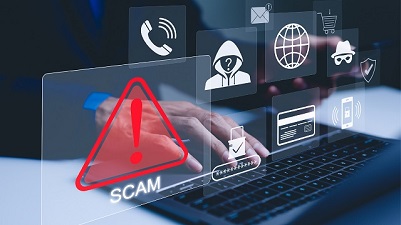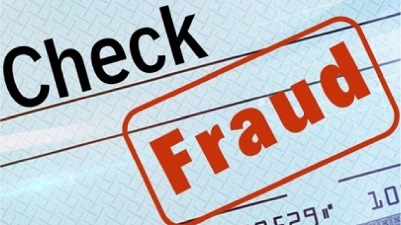


Fraud vs. Scams: What’s the Difference – and Why It Matters
At HHSB, protecting our customers is part of who we are. Whether you’re banking online, visiting a branch, or calling in for help, we’re here to support your financial well-being. That includes helping you understand the difference between fraud and scams—because knowing the difference could protect your account, your identity, and your peace of mind.
First, what’s the difference?
Fraud and scams both involve someone trying to get access to your money or personal information—but they happen in different ways, and the consequences can vary.
Fraud:
This is when someone gains unauthorized access to your account or information—without your knowledge or involvement. You didn’t click on anything, give out your info, or take any action that helped the fraudster. For example:
- Your debit card number is stolen through a data breach.
- Someone creates a fake check with your account info.
- A criminal uses stolen credentials to access your online banking.
In these situations, the customer is often protected from loss under federal regulations. At HHSB, we take fraud seriously and act quickly to resolve issues and restore your accounts.
Scams:
Scams, on the other hand, involve deception and manipulation—where a scammer convinces you to take an action that ultimately helps them steal from you. Examples include:
- A phone call from someone pretending to be “tech support” asking you to share access to your device.
- A text or email claiming there’s a problem with your account and prompting you to click a link.
- A romance scam that builds trust over time and ends in a request for money.
Because the customer plays an active role in these situations—even if unknowingly—liability often falls on the customer. And unfortunately, funds lost to scams are rarely recoverable.
That’s why it’s so important to stay alert and know the warning signs.
How HHSB protects you
We monitor accounts for suspicious activity 24/7, and our digital tools are equipped with industry-leading security. But the best defense is awareness—yours and ours.
We’ll never:
- Ask for your online banking password or access codes
- Text you with links to log into your account
- Pressure you to act immediately or secretly
If something feels off, pause and verify. Call us directly or stop by your local branch. We’re always happy to help.
How you can protect yourself
Here are a few quick tips:
- Never share your login credentials or security codes.
- Don’t click links in unexpected texts or emails.
- Verify the source of any request involving money, even if it seems to come from someone you know.
- Talk it out. Scammers often try to isolate you. If you’re unsure, involve someone you trust—or call us.
What to do if you’ve been a victim
First of all—take a deep breath. It can happen to anyone, and you are not alone. At HHSB, we’re here to support you through it.
If you think you’ve fallen victim to fraud or a scam, here are the steps to take:
- Contact HHSB immediately.
Call your local branch or our main office. The sooner we know, the faster we can help protect your accounts. - Change your passwords.
Update your online banking login and any other accounts that may use the same credentials. - Review your recent transactions.
Keep an eye on your account activity and report anything unfamiliar. - Notify local law enforcement.
File a police report to officially document the incident. This can be helpful if you’re disputing charges, reporting identity theft, or working with your insurance company. - File a report with federal agencies.
- For scams: Visit reportfraud.ftc.gov to report to the Federal Trade Commission.
- For identity theft: Go to identitytheft.gov to create a personalized recovery plan.
- Place a fraud alert.
Contact one of the major credit bureaus (Experian, TransUnion, or Equifax) to place a fraud alert on your credit file. This makes it harder for identity thieves to open new accounts in your name. - Stay vigilant.
Unfortunately, once you’ve been targeted, you may be targeted again. Scammers often share or resell contact info. Be extra cautious moving forward.
Your partner in prevention
At HHSB, we’re more than your bank—we’re your neighbor, your teammate, your trusted partner. We believe knowledge is power, and when it comes to fraud and scams, a little knowledge can go a long way toward keeping your money safe.
If you think you’ve been targeted by fraud or a scam, reach out to us right away. We’re here for you—before, during, and after.
Check Fraud
What is Check Fraud?
Check fraud often involves criminals stealing checks from the mail, altering them, and cashing them for unauthorized amounts. According to a recent poll by the Independent Community Bankers of America® (ICBA), one in five Americans have either experienced check fraud themselves or know someone who has.
Here are some simple but effective ways to reduce your risk:
- Always use the letter slots inside your Post Office or hand checks directly to a mail carrier.
- Pick up your mail promptly and avoid leaving it in your mailbox overnight.
- Sign up for Informed Delivery® through USPS to receive daily email updates on incoming mail.
- Use pens with black indelible ink that can’t be easily washed or altered.
- Don’t leave blank spaces on the check—fill in every line completely.
- Monitor your account activity regularly using online or mobile banking.
- Confirm that checks you send have been received and cashed by the right person.
If you think you’ve been a victim of check fraud, act fast:
- Contact HHSB immediately to report the suspicious activity.
- Request copies of any altered or counterfeit checks.
- Report the incident to local law enforcement, including as much detail as possible: when it occurred, how the fraud happened, and any suspicious activity you noticed.
If you have questions or want to learn more about fraud prevention, contact us at 765-364-0784 or send us a chat in HHSB’s digital banking. Our team is here to offer one-on-one guidance and helpful resources tailored to your needs.

Your Guide to Buying a Home in the Digital Age
Buying a home is one of the most meaningful milestones in life, and in today’s digital world, it often starts with a few clicks. According to the National Association of Realtors, most buyers begin their journey by browsing listings online.
That initial search can be exciting, but it can also be overwhelming. With so much information out there, knowing what’s relevant, trustworthy, and financially sound can be a challenge – especially for first-time buyers.
Recent data shows that younger buyers are leading the charge into homeownership. In fact, 81% of younger millennials made their very first home purchase last year. That’s a big leap, and it underscores just how important it is to have a clear understanding of the homebuying process from the start.
We’re Here to Help You Navigate
There are helpful tools out there, like the Consumer Financial Protection Bureau and the FDIC, but nothing replaces talking to someone who knows your community—and your financial goals—personally.
That’s where HHSB comes in. As your local, employee-owned community bank, we’re committed to walking you through each step of the homebuying journey. Whether you’re just starting to think about buying, or you're ready to find your dream home, our mortgage team is here to help you understand your options, crunch the numbers, and feel confident in your decisions.
Know Your Options
In addition to traditional home loans, there are several programs that can make homeownership more accessible:
- USDA Loans (U.S. Department of Agriculture): Designed for rural and suburban homebuyers with low to moderate income. No down payment required; must meet location and income eligibility.
- VA Loans: Offered through the U.S. Department of Veterans Affairs, these are a fantastic option for eligible veterans, service members, and surviving spouses. No down payment, no mortgage insurance – just a few basic requirements.
- Jumbo Loans: Used for homes that exceed conforming loan limits (which vary by area). Requires strong credit, larger down payments, and thorough documentation.
- Down Payment Assistance: Indiana and surrounding communities also offer first-time buyer incentives and down payment assistance programs. We can help you explore these options and determine your eligibility.
Even if you’re not quite ready to buy, we can help you prepare. From creating a savings plan to understanding your credit score, we’ll work with you to set financial goals and timelines, so when the time is right, you're ready.
This National Homeownership Month, reach out to HHSB. We’re more than just your mortgage lender – we’re your neighbor, your partner, and your guide on the road to homeownership.

